Abstract
1. In the present study, we have investigated the role of kinins in allergen-induced bronchoconstriction. 2. Anaesthetized guinea-pigs were sensitized to ovalbumin, ventilated artificially, pretreated with atropine (1.4 mumol kg-1, i.v.) and total pulmonary resistance (RL) measured. In preliminary studies in the presence of the neutral endopeptidase inhibitor, phosphoramidon (4.5 mumol kg-1, i.v.), the bradykinin B2 receptor antagonist Hoe 140 (0.1 mumol kg-1, i.v.) completely abolished the increase in RL following aerosolized bradykinin (1 mM, 40 breaths), but had no effect on the increase in RL following aerosolized neurokinin A (NKA, 10 microM, 40 breaths). On the other hand, a combination of the NK1 (CP-96,345, 2 mumol kg-1, i.v.) and NK2 (SR 48968, 0.3 mumol kg-1, i.v.) tachykinin receptor antagonists abolished completely the increase in RL produced by NKA and partially inhibited the increase in RL produced by bradykinin. These results confirm previous studies that suggest that bradykinin induces the release of tachykinins from sensory nerves in guinea-pig airways. 3. Aerosolized ovalbumin (0.5%, 5 breaths) increased RL in sensitized guinea-pigs pretreated with atropine (1.4 mmol kg-1, i.v.), an effect that began within 2 min and reached a maximum within 5 min; RL remained above baseline at 20 min. Pretreatment with the bradykinin B2 receptor antagonist, Hoe 140, decreased the bronchoconstrictor effect of ovalbumin markedly at 10 to 20 min. In the presence of phosphoramidon (4.5 mumol kg-1, i.v.) the inhibition induced by Hoe 140 was apparent earlier and remained over the 20 min period of study.(ABSTRACT TRUNCATED AT 250 WORDS)
Full text
PDF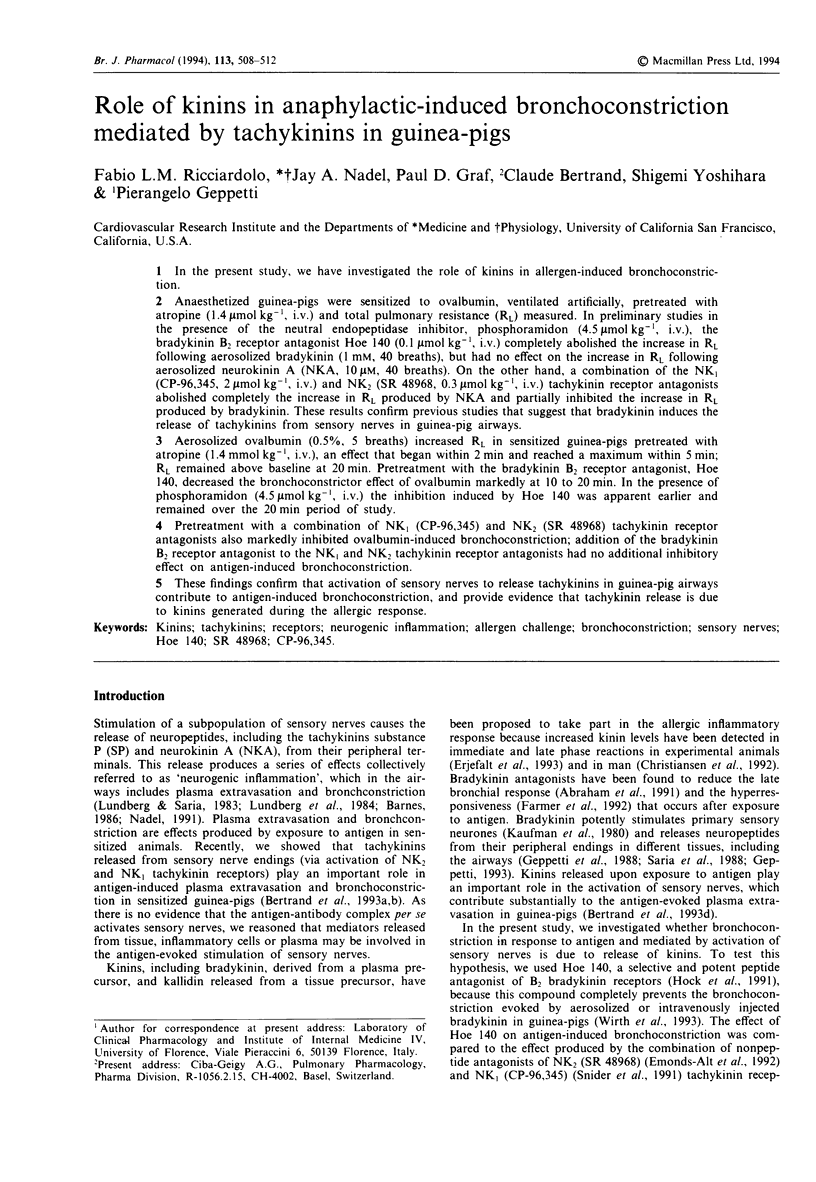
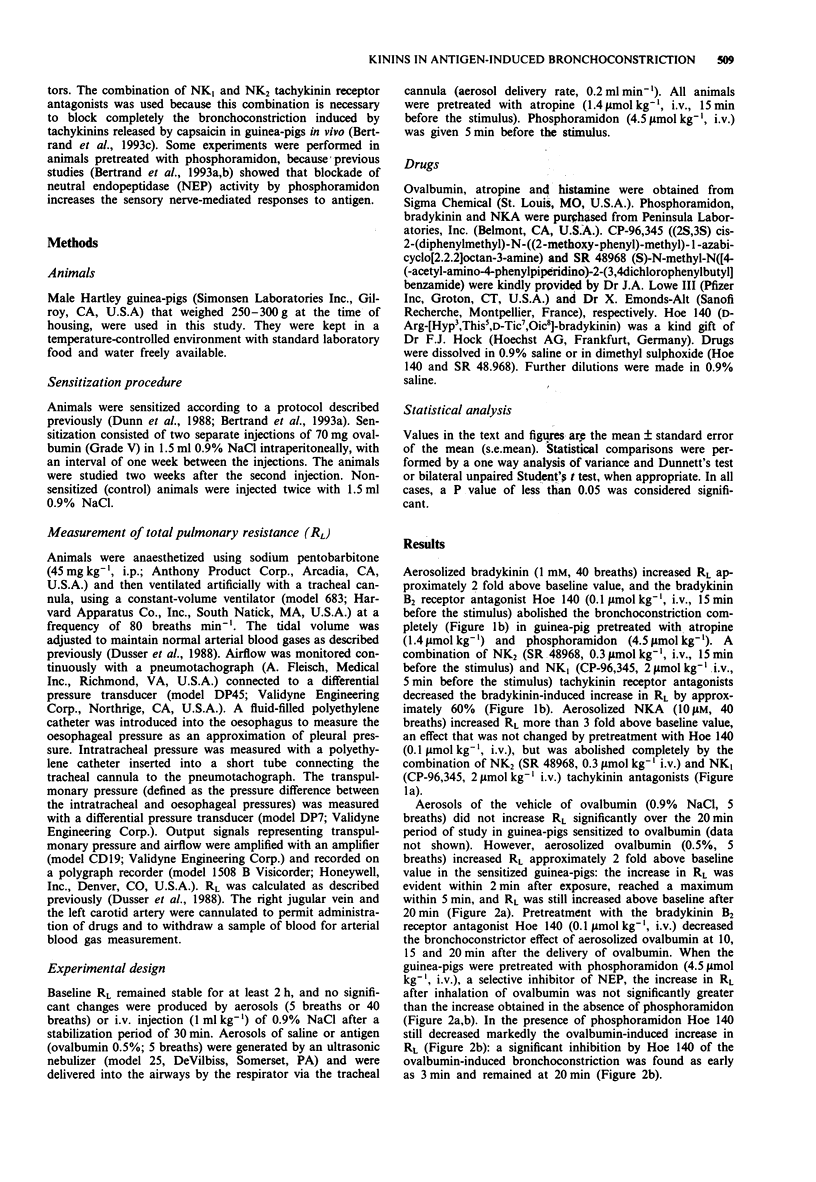
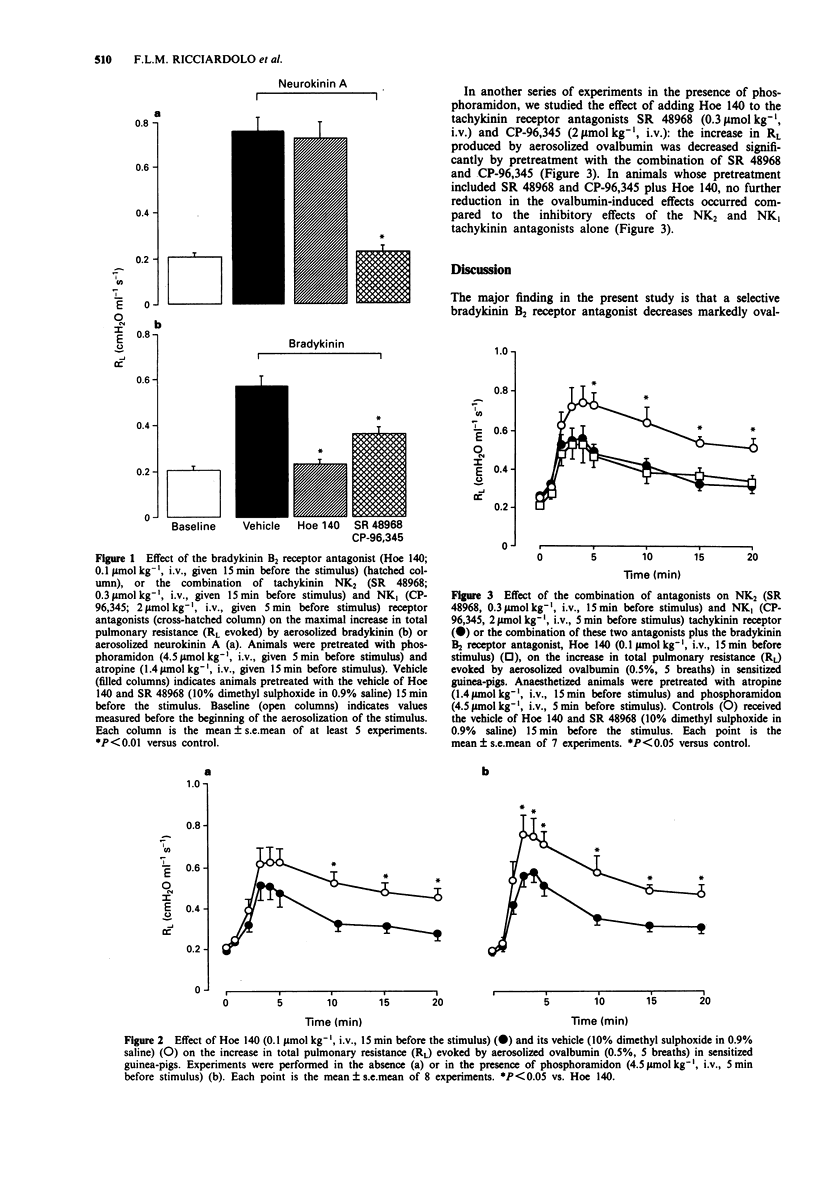
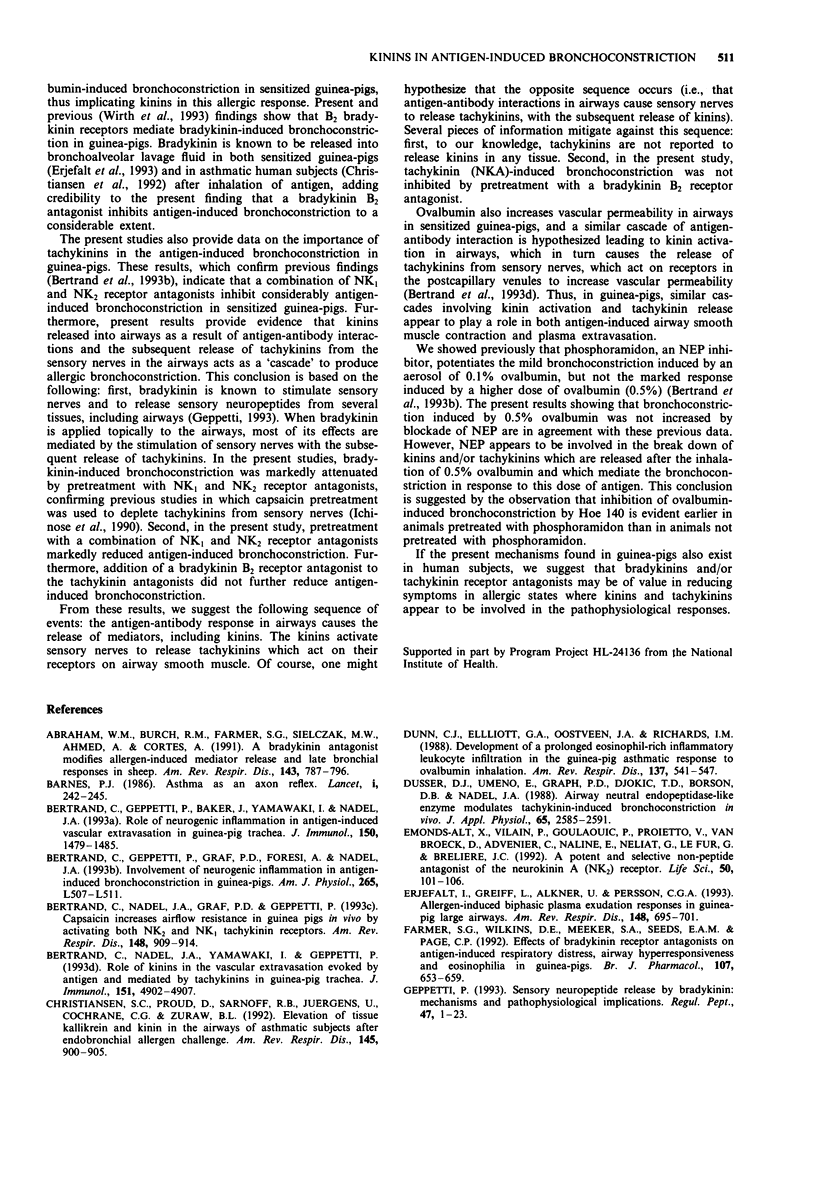
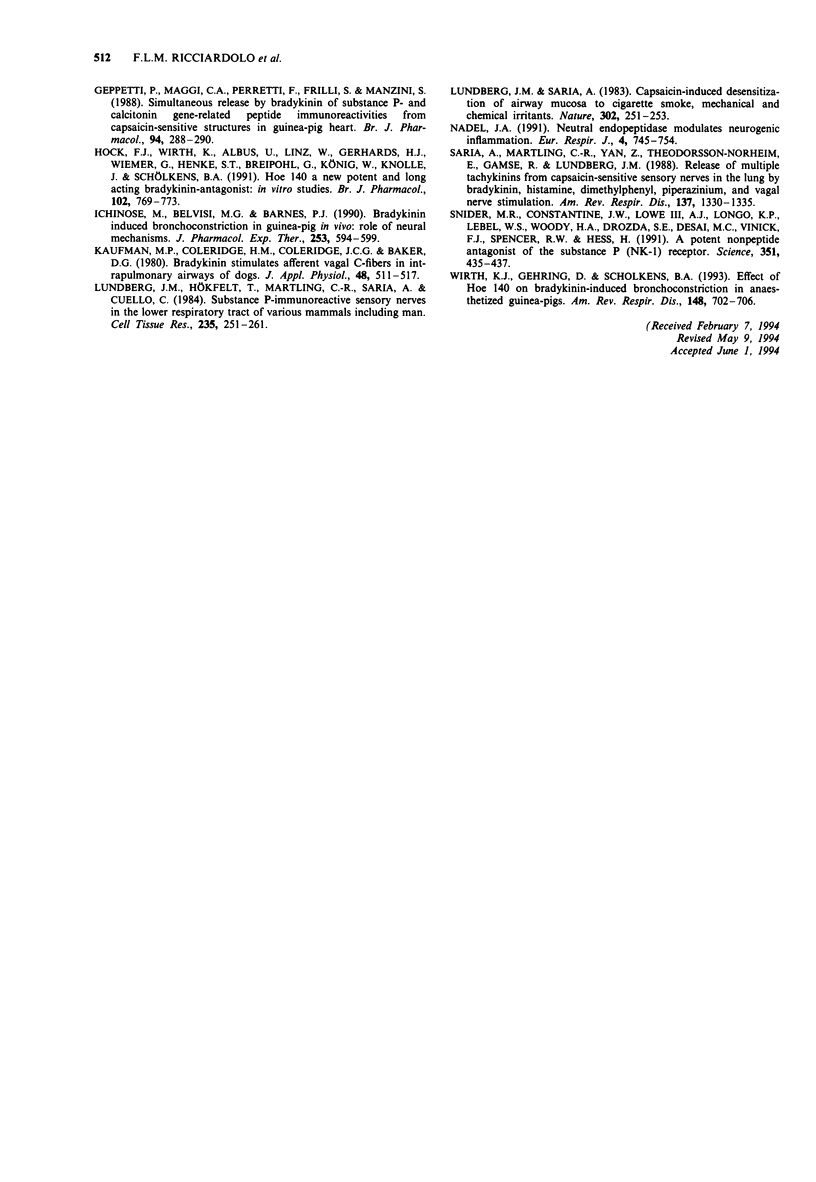
Selected References
These references are in PubMed. This may not be the complete list of references from this article.
- Abraham W. M., Burch R. M., Farmer S. G., Sielczak M. W., Ahmed A., Cortes A. A bradykinin antagonist modifies allergen-induced mediator release and late bronchial responses in sheep. Am Rev Respir Dis. 1991 Apr;143(4 Pt 1):787–796. doi: 10.1164/ajrccm/143.4_Pt_1.787. [DOI] [PubMed] [Google Scholar]
- Barnes P. J. Asthma as an axon reflex. Lancet. 1986 Feb 1;1(8475):242–245. doi: 10.1016/s0140-6736(86)90777-4. [DOI] [PubMed] [Google Scholar]
- Bertrand C., Geppetti P., Baker J., Yamawaki I., Nadel J. A. Role of neurogenic inflammation in antigen-induced vascular extravasation in guinea pig trachea. J Immunol. 1993 Feb 15;150(4):1479–1485. [PubMed] [Google Scholar]
- Bertrand C., Geppetti P., Graf P. D., Foresi A., Nadel J. A. Involvement of neurogenic inflammation in antigen-induced bronchoconstriction in guinea pigs. Am J Physiol. 1993 Nov;265(5 Pt 1):L507–L511. doi: 10.1152/ajplung.1993.265.5.L507. [DOI] [PubMed] [Google Scholar]
- Bertrand C., Nadel J. A., Graf P. D., Geppetti P. Capsaicin increases airflow resistance in guinea pigs in vivo by activating both NK2 and NK1 tachykinin receptors. Am Rev Respir Dis. 1993 Oct;148(4 Pt 1):909–914. doi: 10.1164/ajrccm/148.4_Pt_1.909. [DOI] [PubMed] [Google Scholar]
- Christiansen S. C., Proud D., Sarnoff R. B., Juergens U., Cochrane C. G., Zuraw B. L. Elevation of tissue kallikrein and kinin in the airways of asthmatic subjects after endobronchial allergen challenge. Am Rev Respir Dis. 1992 Apr;145(4 Pt 1):900–905. doi: 10.1164/ajrccm/145.4_Pt_1.900. [DOI] [PubMed] [Google Scholar]
- Dunn C. J., Elliott G. A., Oostveen J. A., Richards I. M. Development of a prolonged eosinophil-rich inflammatory leukocyte infiltration in the guinea-pig asthmatic response to ovalbumin inhalation. Am Rev Respir Dis. 1988 Mar;137(3):541–547. doi: 10.1164/ajrccm/137.3.541. [DOI] [PubMed] [Google Scholar]
- Dusser D. J., Umeno E., Graf P. D., Djokic T., Borson D. B., Nadel J. A. Airway neutral endopeptidase-like enzyme modulates tachykinin-induced bronchoconstriction in vivo. J Appl Physiol (1985) 1988 Dec;65(6):2585–2591. doi: 10.1152/jappl.1988.65.6.2585. [DOI] [PubMed] [Google Scholar]
- Erjefält I., Greiff L., Alkner U., Persson C. G. Allergen-induced biphasic plasma exudation responses in guinea pig large airways. Am Rev Respir Dis. 1993 Sep;148(3):695–701. doi: 10.1164/ajrccm/148.3.695. [DOI] [PubMed] [Google Scholar]
- Farmer S. G., Wilkins D. E., Meeker S. A., Seeds E. A., Page C. P. Effects of bradykinin receptor antagonists on antigen-induced respiratory distress, airway hyperresponsiveness and eosinophilia in guinea-pigs. Br J Pharmacol. 1992 Nov;107(3):653–659. doi: 10.1111/j.1476-5381.1992.tb14502.x. [DOI] [PMC free article] [PubMed] [Google Scholar]
- Geppetti P., Maggi C. A., Perretti F., Frilli S., Manzini S. Simultaneous release by bradykinin of substance P- and calcitonin gene-related peptide immunoreactivities from capsaicin-sensitive structures in guinea-pig heart. Br J Pharmacol. 1988 Jun;94(2):288–290. doi: 10.1111/j.1476-5381.1988.tb11528.x. [DOI] [PMC free article] [PubMed] [Google Scholar]
- Geppetti P. Sensory neuropeptide release by bradykinin: mechanisms and pathophysiological implications. Regul Pept. 1993 Aug 13;47(1):1–23. doi: 10.1016/0167-0115(93)90268-d. [DOI] [PubMed] [Google Scholar]
- Hock F. J., Wirth K., Albus U., Linz W., Gerhards H. J., Wiemer G., Henke S., Breipohl G., König W., Knolle J. Hoe 140 a new potent and long acting bradykinin-antagonist: in vitro studies. Br J Pharmacol. 1991 Mar;102(3):769–773. doi: 10.1111/j.1476-5381.1991.tb12248.x. [DOI] [PMC free article] [PubMed] [Google Scholar]
- Ichinose M., Belvisi M. G., Barnes P. J. Bradykinin-induced bronchoconstriction in guinea pig in vivo: role of neural mechanisms. J Pharmacol Exp Ther. 1990 May;253(2):594–599. [PubMed] [Google Scholar]
- Kaufman M. P., Coleridge H. M., Coleridge J. C., Baker D. G. Bradykinin stimulates afferent vagal C-fibers in intrapulmonary airways of dogs. J Appl Physiol Respir Environ Exerc Physiol. 1980 Mar;48(3):511–517. doi: 10.1152/jappl.1980.48.3.511. [DOI] [PubMed] [Google Scholar]
- Lundberg J. M., Hökfelt T., Martling C. R., Saria A., Cuello C. Substance P-immunoreactive sensory nerves in the lower respiratory tract of various mammals including man. Cell Tissue Res. 1984;235(2):251–261. doi: 10.1007/BF00217848. [DOI] [PubMed] [Google Scholar]
- Lundberg J. M., Saria A. Capsaicin-induced desensitization of airway mucosa to cigarette smoke, mechanical and chemical irritants. Nature. 1983 Mar 17;302(5905):251–253. doi: 10.1038/302251a0. [DOI] [PubMed] [Google Scholar]
- Nadel J. A. Neutral endopeptidase modulates neurogenic inflammation. Eur Respir J. 1991 Jun;4(6):745–754. [PubMed] [Google Scholar]
- Saria A., Martling C. R., Yan Z., Theodorsson-Norheim E., Gamse R., Lundberg J. M. Release of multiple tachykinins from capsaicin-sensitive sensory nerves in the lung by bradykinin, histamine, dimethylphenyl piperazinium, and vagal nerve stimulation. Am Rev Respir Dis. 1988 Jun;137(6):1330–1335. doi: 10.1164/ajrccm/137.6.1330. [DOI] [PubMed] [Google Scholar]
- Snider R. M., Constantine J. W., Lowe J. A., 3rd, Longo K. P., Lebel W. S., Woody H. A., Drozda S. E., Desai M. C., Vinick F. J., Spencer R. W. A potent nonpeptide antagonist of the substance P (NK1) receptor. Science. 1991 Jan 25;251(4992):435–437. doi: 10.1126/science.1703323. [DOI] [PubMed] [Google Scholar]
- Wirth K. J., Gehring D., Schölkens B. A. Effect of Hoe 140 on bradykinin-induced bronchoconstriction in anesthetized guinea pigs. Am Rev Respir Dis. 1993 Sep;148(3):702–706. doi: 10.1164/ajrccm/148.3.702. [DOI] [PubMed] [Google Scholar]


